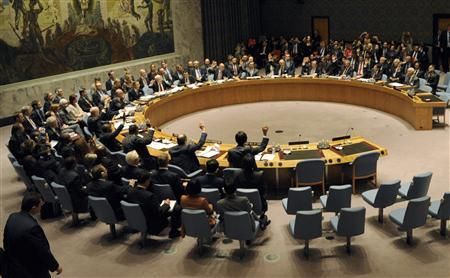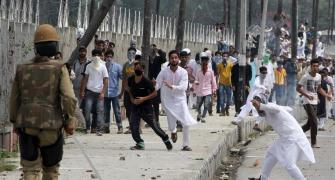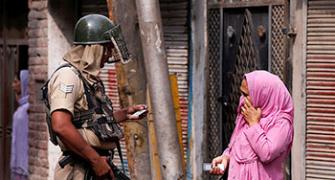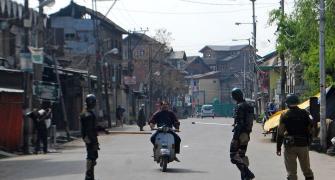 Raising the issue of Balochistan for the first time before the United Nation, India on Wednesday accused Pakistan of widespread human rights violations there as well as in Pakistan-occupied Kashmir.
Raising the issue of Balochistan for the first time before the United Nation, India on Wednesday accused Pakistan of widespread human rights violations there as well as in Pakistan-occupied Kashmir.
In a scathing attack on Pakistan during the 33rd Session of the UN Human Rights Council in Geneva, India said the main reason for disturbances in Kashmir is the cross-border terrorism sponsored by Pakistan that stems from its territorial ambitions over the place that has found concrete expression in repeated armed aggression.
Pakistan's dismal track record is well known and many countries have repeatedly called upon Pakistan to end cross-border infiltration; dismantle the terrorism infrastructure; and stop acting as an epicentre of terrorism, India's Ambassador and Permanent Representative at the UN in Geneva Ajit Kumar said.
India's credentials as a peaceful, democratic, pluralistic society that is deeply committed to the welfare of its people are well established and on the contrary, Pakistan is characterised by authoritarianism, absence of democratic norms and widespread human rights violations across the country including Balochistan, Kumar said.
Exercising its right of reply to the statement made by Pakistan, Kumar said Pakistan is a country, which has systematically abused and violated the human rights of its own citizens, including in Balochistan, as well as of the people of Pakistan-occupied Kashmir.
"The fundamental reason for disturbances in Kashmir is the cross-border terrorism sponsored by Pakistan which has provided active support since 1989 to separatist groups and terrorist elements including those operating from the territory under Pakistan’s control.
"Pakistan has once again sought to mask its territorial ambitions and use of terrorism as a state policy under the garb of concern for human rights.
"J&K is an integral part of India and will always remain so. We reject attempts by Pakistan to denigrate the democratic choice that has been regularly exercised by the people of J&K," he said.
In a no-holds-barred offensive, India said while advocating restraint to others, Pakistan has no hesitation in using air power against its own people.
"Pakistan also continues to provide sanctuary to UN-designated terrorists. It was, therefore, no surprise that Pakistan failed to convince the international community to secure the membership of the Human Rights Council last year," Kumar added.
India strongly rejects Pakistan's continued misuse of the Council to make tendentious references about internal matters pertaining to the Indian state of J&K, the ambassador said.
"This stems from Pakistan's territorial ambitions over Kashmir that has found concrete expression in repeated armed aggressions. Pakistan continues to be in illegal occupation of a large part of territory in J&K," he said.
Reiterating that the situation in the Valley arose from the death of a self-acknowledged commander of Hizb-ul-Mujahideen terror group, India said it was further aggravated by sustained cross-border terrorism emanating from Pakistan.
Kumar said the high number of causalities sustained by Indian security forces is a reflection of the tremendous restraint they have displayed in difficult circumstances.
Kumar asserted that India has a robust institutional framework to ensure adherence to rule of law and respect for fundamental rights of the people in J&K, including independent judiciary, National Human Rights Commission, vibrant civil society and free and vocal media.
In contrast, the people of Pakistan as well as Pakistan occupied Kashmir have become victims of sectarian conflict, terrorism and extreme economic hardship due to Pakistan's authoritarian and discriminatory policies in complete disregard of human rights, he added.
Emphasising that terrorism was the grossest violation of human rights and should be so acknowledged by any impartial observer.
"The heart of the matter is that we are dealing with a state that regards the use of terrorism as a legitimate instrument of statecraft.
"The world watches with concern as the consequences of Pakistan’s actions have spread beyond its immediate neighbour. All of us stand prepared to help, if only the creators of this monster wake up to the dangers of what they have done to themselves," the Indian envoy added.
"The institutions of governance in Pakistan have corroded to such an extent that it has become a hub for the global export of terror," he said.
The envoy also said that it will be in the fitness of things if instead of ritually raking up alleged human rights violations elsewhere, Pakistan were to focus its energies on improving human rights situation within Pakistan and Pakistan-occupied Kashmir.
It must also take action against the perpetrators of terrorist attacks on its neighbours who are roaming freely in Pakistan with impunity, so that terrorism emanating from Pakistan -- the gravest risk for peace and stability of the region -- could be addressed effectively, he added.









